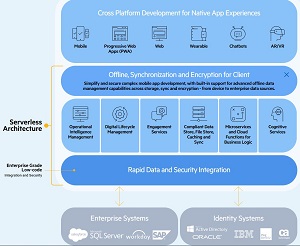News
Progress Updates Low-Code-for-Pros Kinvey Platform
- By David Ramel
- March 18, 2019
Progress Software has updated its low-code Kinvey platform that -- unlike competitors that target the "business user" audience -- positions itself as a productivity tool for professional developers.
Progress said it's providing a "new form of low-code platform" that's focused on professional developers, enabling high productivity capabilities along with delivery of different apps that run natively across devices and platforms across multiple channels.
"Traditional low-code platforms are adequate for helping companies rapidly roll out many tactical apps," said CTO Dmitri Tcherevik in a statement last week. "However, they lack the ability to deliver high scale, truly engaging, consumer-grade experiences that offer consistency across channels.
"At the other end of the spectrum, DIY development projects deliver high-touch experiences, but are highly inefficient, slow to market and costly to maintain. IT teams need to focus on innovation, not infrastructure. Our focus on high productivity for professional developers changes all of that by bringing a solution to market that offers the best of both worlds, low-code development that results in flexible, scalable, omni channel apps."
The low-code arena has exploded over the past several years, with most offerings targeting enterprises in need of more business apps but who lack the requisite stable of professionally trained coders needed to keep the app stream flowing. With simplified workflows like drag-and-drop composability, wizards, template- and model-driven projects and so on, the attraction of the tools is typically that they can be used by "citizen developers" or "ordinary business users" to quickly producing purpose-built enterprise apps.
The JavaScript-based Kinvey platform helps developers use that ubiquitous programming language and various flavors -- including Progress' own NativeScript along with Angular, TypeScript and Vue.js -- for projects that can share code across Web, iOS and Android, and even chat applications.
 [Click on image for larger view.]
Kinvey Platform (source: Progress Software)
[Click on image for larger view.]
Kinvey Platform (source: Progress Software)
The Progress site says developers have attained 100 percent code reuse across iOS and Android projects, along with 70 percent code reuse across Progressive Web Applications (PWA) and native mobile apps.
The company said its Kinvey platform offers:
- Kinvey Studio: A visual development tool that provides a low-code development environment for rapidly building mobile, Web and chat-based apps, without sacrificing full developer control over the application and code.
- Serverless Platform Architecture: The serverless high productivity cloud platform manages and auto-scales secure business app infrastructures across data, authentication, microservices and functions, and supports both deploying and scaling modern apps.
- Kinvey Chat: An artificial intelligence-driven technology for rapidly creating and deploying guided task chatbots that integrate with existing enterprise and legacy systems.
- Kinvey Data Pipeline: Providing end-to-end data and authentication management from device to source enterprise systems; engineered to protect, virtualize and synchronize data and authentication layers from disparate enterprise systems, this capability includes cloud caching, offline data management with delta synchronization, identity integrations and no-code/low-code microservices to access external data.
- Native Multi-channel: Building off the popularity of JavaScript, NativeScript and Angular, the Kinvey platform enables the development and delivery of native iOS, Android and Web apps to create beautiful, consumer-grade UX while providing significant code reuse between the Web and mobile tiers. It also provides direct access to all native platform APIs and third-party iOS and Android code, ensuring apps built on Kinvey offer a no-compromise native experience.
Progress provided more details on Kinvey Studio and Kinvey Chat in a March 14 blog post.
The Kinvey platform update is available now.
About the Author
David Ramel is an editor and writer at Converge 360.